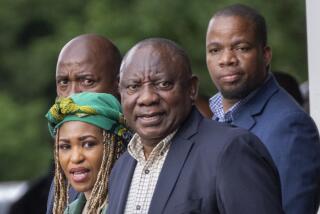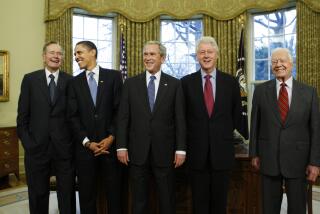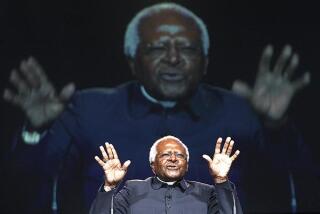Nation Suffered as Dictator Drained Riches
- Share via
PARIS — Mobutu Sese Seko may have given up his power, but during three decades the dictator who promised his impoverished African land that he would live on his soldier’s pay salted away a vast secret fortune often estimated at as much as $5 billion.
That huge sum would make him richer than well-known tycoons such as Rupert Murdoch or Ross Perot. It would give Zaire’s longtime ruler the same assessed value as many Fortune 500 corporations.
During Mobutu’s years in power, Zaire’s treasury was plundered, foreign aid--including U.S. taxpayer money channeled through the CIA and other agencies--siphoned off, economic assets such as copper mines and cocoa plantations embezzled from, and bribes demanded and obtained.
The former army general appeared to consider his country--the repository of vast deposits of diamonds, timber, copper, cobalt and other natural resources--to be his private plantation.
“I owe Zaire nothing,” Mobutu has said. “It’s Zaire that owes me everything.”
*
A few years ago, an employee of a U.N. agency based in Geneva recalled, there was an army revolt in Zaire, and Mobutu’s position looked shaky. That night, the employee recalled, he heard the droning of an airplane.
It was the Zairian presidential jet, he later learned, ferrying in a last-minute shipment of coffee for sale in Europe.
“Mobutu could just never steal enough,” the employee said. “He had to have every last bean.”
Mobutu himself told a reporter for Time magazine in 1993 that his available funds “amounted to no more than $10 million.” But that, Mobutu said, did not include foreign real estate holdings or nonliquid assets.
On Friday, hours before the cancer-stricken 66-year-old left Kinshasa, Switzerland ordered a freeze on his luxury villa in Savingy near Lausanne, which local tax authorities valued at $2.75 million.
The Swiss property includes a large house, swimming pools, garages, a tree-fringed pond and a small chalet nestled in a garden.
Under the Swiss order, the estate in the canton of Vaud now cannot be sold or transferred until further notice. The rebels fighting Mobutu had asked that his assets in the country be impounded.
But the decision by Swiss authorities did not affect any of Mobutu’s bank assets that still may be in the country, which at one time were believed to total about $4 billion. And he has plenty of other properties elsewhere.
Those include a vacation home at Cap-Martin on the Mediterranean coast of France worth more than $4 million, an apartment on the upscale Avenue Foch in Paris, numerous properties in Belgium, a home in Madrid, a seaside villa and hotel in Marbella, Spain, and a chateau in southern Portugal that is said to boast a wine cellar stocked with 14,000 bottles of choice vintages.
In Zaire alone, Mobutu owns 11 palaces, a luxury yacht on the Zaire River and a private gold mine that reportedly holds 100 tons of gold spread over 32,000 square miles.
*
The palace he reportedly retreated to on Friday, in his tribal homeland northeast of Kinshasa, is built of marble, has sprawling grounds stocked with lions and elephants, a moat filled with crocodiles, computer-controlled fountains and its own airport.
A recent investigation by the Financial Times newspaper of London found Mobutu to be in possession of at least 20 properties from “Belgium to Ivory Coast, from Switzerland to Morocco,” with a minimum assessed value of $37 million. Mobutu’s real estate holdings may exceed 30 properties.
The newspaper found the precise size of his fortune impossible to determine because “much of the property is held in the names of front companies, business associates and family members not using the Mobutu name.”
Under Mobutu, the Financial Times found, Zaire--a land of 45 million people--was used by the president as little more than a personal piggy bank.
In 1978, the paper said, “the state-owned copper and cobalt giant Gecamines was instructed to deposit its entire export earnings--which by 1989 had reached $1.2 billion--into a presidential account.”
According to two U.S. researchers, Steve Askin and Carole Collins, Mobutu was on the take from foreign private investors and foreign governments and security agencies alike.
“Starting in the late 1960s, presidential appropriations officially consumed 15% to 20% of the government’s operating budget and 30% to 50% of the capital budget,” Askin and Collins also found.
Jose Mutombo-Kady, a Zairian rebel representative in Geneva, has claimed that Mobutu “could pick up the phone and ask the Central Bank of Zaire to bring around $500,000,” and it would arrive.
Nguza Karl-I-Bond, a former prime minister, believes that Mobutu had amassed $4 billion by the late 1970s.
The embezzled and skimmed-off monies were used not only to support Mobutu and his extended family in grand style but also to assure the loyalty of the presidential guard, a large network of political cronies and government officials and friendly foreign politicians.
As Mobutu’s reign reached its twilight, the responsibility of the West--and of the United States in particular--in allowing what is generally considered the greatest act of wholesale larceny committed in post-colonial Africa was being debated.
“At the beginning, we thought Mobutu was the only person who could lead Zaire,” Leo Tindemans, the former prime minister of Belgium, Zaire’s onetime colonial master, told the Financial Times. “We thought he had the talent, capacity and intelligence. . . . Then he changed. He just wanted the money, from wherever he could get it--private companies, foreign governments. He had no feeling for financial policy, but it didn’t matter. He knew the money would keep on coming.”
Between 1970 and 1994, the newspaper said, Zaire received $8.5 billion in loans and grants from Western donors, including multilateral financial institutions.
*
Succeeding U.S. administrations, starting with the Kennedy presidency, backed Mobutu because he seemed a reliable friend.
Americans involved with the CIA’s Zaire-based war against formerly Marxist Angola said the agency made covert multimillion-dollar payments to Mobutu to fund specific military missions, but that the money never went where it was supposed to go.
Although U.S. aid to Zaire stopped after the breakup of the Soviet Union, one preliminary estimate found that Zaire still owes the U.S. $1.5 billion in unpaid loans.
The end of the Cold War struggle for influence in Africa left Mobutu bereft of most of his friends in Washington.
When the rebels led by Laurent Kabila seized control of much of Zaire’s natural resources, they also deprived Mobutu of much of his revenue, and hence much of his influence and power as well.
U.S. officials in Washington have estimated Mobutu’s wealth at $3 billion to $5 billion, but they say it probably peaked a decade ago and shrank substantially as he spent in an increasingly vain struggle to stay in power.
The rebel Alliance of Democratic Forces for the Liberation of Congo-Zaire began legal efforts last week to seize money or assets belonging to Mobutu in Switzerland, France, Belgium, Portugal, Austria and the United States.
In seizing the estate near Lausanne, the Swiss were acting on a request from the public prosecutor of the rebel-held Zairian town of Lubumbashi.
Recovering any assets held by banks may be much more difficult. Rebel alliance official Ghislain Demofik acknowledged that much of that money may never be recovered because it might be in accounts under other names. Some Swiss sources doubt that much of Mobutu’s money remains in their country because banking regulations were tightened in the 1990s to curtail secrecy.
Some Africans say that the greed of the Mobutu years was so enormous that the former leader should not be allowed to slip quietly into exile but rather should be held to account.
“The world should take steps to set up an international tribunal to try Mobutu; otherwise this encourages impunity,” Tito Rutaremara, a member of Rwanda’s parliament, said after a conference in Lisbon on the subject of Central Africa.
Other participants said that if Mobutu flees to Morocco or France, as some expect, he should be extradited back to Zaire.
“People who appropriate collective goods should be tried,” said J. Victor da Silva Angelo, U.N. resident representative in Tanzania.
(BEGIN TEXT OF INFOBOX / INFOGRAPHIC)
Property From Belgium to Brazil
Mobutu Sese Seko’s fortune has been estimated at as much as $5 billion. His property empire is said to encompass at least 30 real estate holdings at minimum combined value of $37 million.
Belgium: Nine properties
France: Cap-Martin, Paris
Portugal: Algarve
Morocco: Marrakech
Brazil
Switzerland: Savigny
Spain: Madrid, Marbella
Senegal: Dakar
Ivory Coast: Abidjan
Zaire: 11 properties
South Africa: Johannesburg
More to Read
Sign up for Essential California
The most important California stories and recommendations in your inbox every morning.
You may occasionally receive promotional content from the Los Angeles Times.










